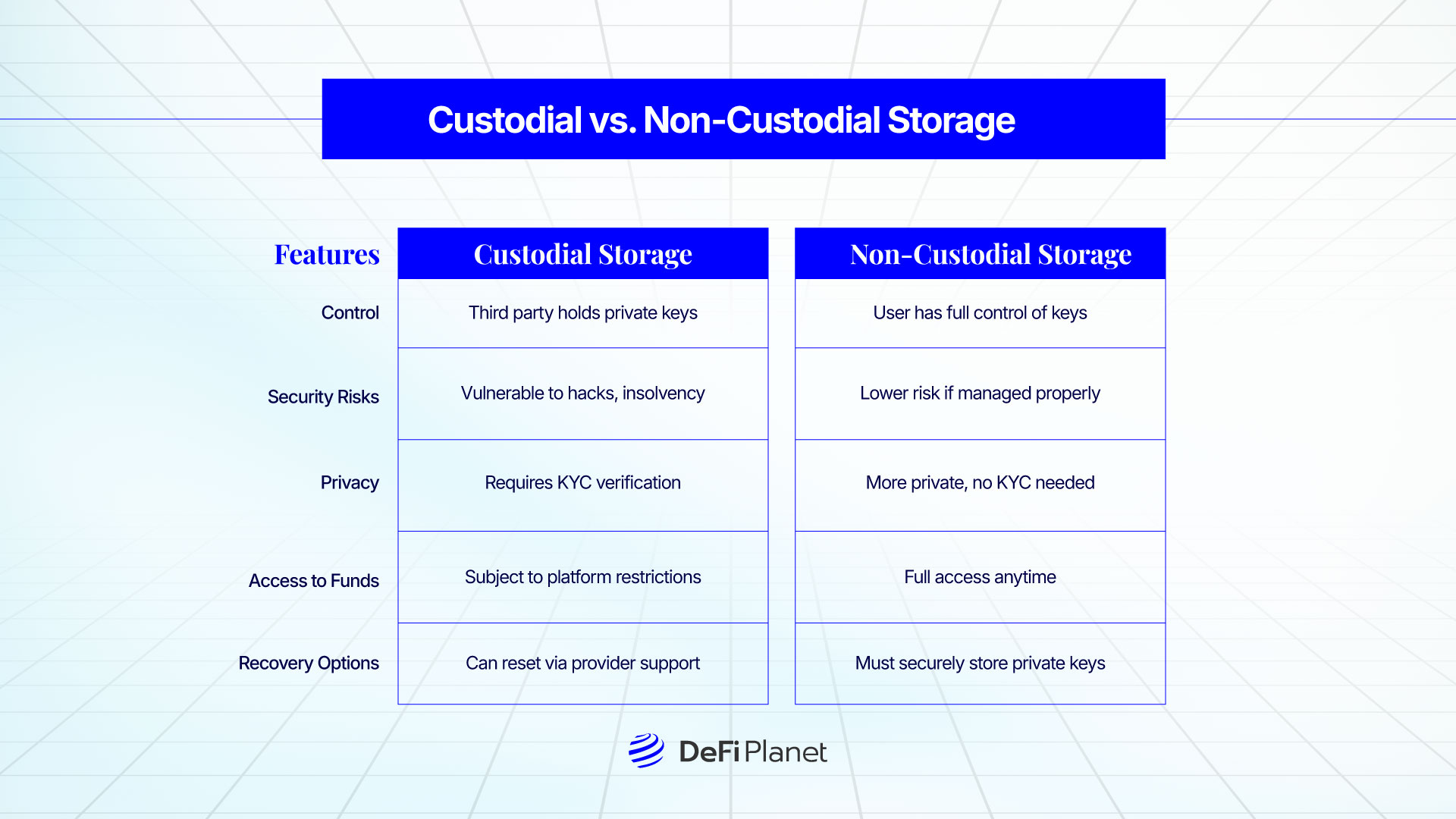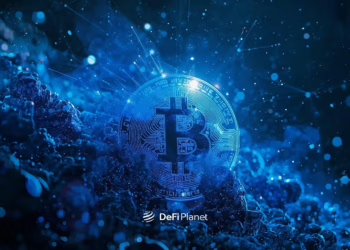Last updated on June 20th, 2025 at 03:32 pm
Despite their convenience, centralized crypto exchanges have repeatedly proven to be high-risk platforms. From massive hacks and internal fraud to abrupt government crackdowns, the dangers of holding your crypto on exchanges are real—and often devastating.
Still, many investors leave their digital assets in the hands of third-party platforms, trusting that these businesses will manage their funds securely. But here’s the uncomfortable truth: holding your crypto in an exchange isn’t the same as owning it. It’s more like giving someone else your wallet and hoping they won’t lose it, abuse it, or have it seized.
This article explores the hidden dangers of keeping your crypto in centralized exchanges and why self-custody matters more than ever.
Let’s start by breaking down the risks, one by one, with real-world examples that show just how bad things can get when control is out of your hands.
Cyberattacks: Exchanges are easy targets for hackers
Exchanges are honeypots. They hold large sums of digital assets in hot wallets, making them attractive targets for cybercriminals. The result? Some of the biggest heists in crypto history.
Take Mt. Gox, for example. Once the largest Bitcoin exchange globally, it lost 850,000 BTC in a series of attacks—most of which went undetected for years. When the theft finally came to light in 2014, it wasn’t just Mt. Gox that collapsed. The incident shattered trust in centralized platforms, causing a major market crash and leaving users with little to no recourse.
Even today, major platforms remain vulnerable. Binance was hacked for 7,000 BTC in 2019, though it recovered thanks to its SAFU fund. The same for Bybit in February 2025..
Smaller platforms rarely have that kind of safety net, meaning users are often left to bear the full loss when things go south.
Insider fraud: When the enemy is inside
Sometimes the danger isn’t a hacker—it’s the people running the exchange. Internal fraud and misappropriation of funds have become disturbingly common, especially in cases where there’s no meaningful oversight or transparency. Even the most polished platforms can hide rot beneath the surface, and users are often the last to know until it’s too late.
The fall of FTX in 2022 is the perfect example. On the surface, FTX was a reputable exchange with strong branding, deep liquidity, and a charismatic CEO. Underneath, it was a house of cards. Executives secretly used billions of dollars in user funds to prop up failing bets at their sister company, Alameda Research.
There were no independent audits, no checks on how funds were handled, and no separation between customer assets and company liabilities. When the truth came out, it wasn’t just FTX that collapsed—it took much of the crypto market with it.
READ MORE: What Happened to FTX: The Anatomy of an Implosion
Operational Mismanagement: Incompetence is also a threat
Fraud isn’t always the cause of a collapse—sometimes it’s good old-fashioned incompetence. Poor security practices, lack of internal controls, or simply bad management decisions can all put customer assets at risk.
The collapse of QuadrigaCX in 2018 stands out here. The Canadian exchange owed customers $190 million, but access to the bulk of its crypto holdings was lost when its founder, Gerald Cotten, died unexpectedly. He was the only one with the passwords to the cold wallets. There was no backup plan, no succession protocol, and no operational redundancy.
To make matters worse, a later investigation found Cotten had likely been running a Ponzi scheme, using customer deposits to fund personal expenses and trading losses. The exchange didn’t just fail—it never operated responsibly in the first place.
Even well-meaning platforms can implode due to bad decisions or sloppy practices. When you hold your crypto on an exchange, you’re betting that the team behind it is competent. That’s not always a safe assumption.
Regulatory crackdowns: Collateral damage from the legal system
Centralized exchanges operate in a legal gray zone in many jurisdictions. When the rules change—or when regulators decide to enforce them—users can quickly find themselves caught in the middle.
In 2021, China’s sweeping crackdown on crypto hit users hard. Overnight, exchanges were forced to shut down operations. Accounts were frozen, withdrawals were blocked, and users were suddenly locked out of their funds with no warning and no timeline for resolution.
READ MORE: Assessing the Impact of China’s Crypto Crackdown
Similar risks exist elsewhere. In 2024, the German Federal Criminal Police (BKA) shut down nearly 50 Russian-language exchanges for violating KYC rules. Users who had relied on these platforms for privacy found themselves exposed and unable to access their assets.
The risk here isn’t just about legality—it’s about centralization. When an exchange controls the wallet, regulators only need to hit one target to freeze thousands of accounts. It’s efficient for law enforcement—but devastating for users.
Account freezes, errors, and bureaucracy
Even without a major scandal or legal action, users can lose access to their funds due to simple errors, internal policies, or automated systems that flag accounts incorrectly.
If your exchange account is flagged for suspicious activity—rightly or wrongly—there’s a good chance it will be frozen pending a compliance review. Depending on the platform, that process could take days, weeks, or even months. In some cases, users never get a resolution.
Unlike with self-custody, where you hold your own keys and transact freely, using an exchange means surrendering control. You’re subject to the platform’s rules, timelines, and customer service (or lack thereof). And when you need urgent access to your funds, that can turn into a nightmare.
Why Self-Custody Is the Safer Option
All of these risks boil down to one core issue: control. When you leave your crypto in an exchange, you’re no longer in full control of it. You’re trusting a third party to act in your best interest—and history shows that’s often a losing bet.
Self-custody isn’t just a slogan—it’s a security model. If you’re serious about protecting your digital assets, it’s time to start treating exchanges as temporary tools, not permanent vaults.
1. True control over your assets
When you choose self-custody, you gain full control of your private keys—the cryptographic strings that unlock your crypto funds on the blockchain. Think of private keys as the password to your digital vault. Without them, ownership is merely an illusion.
As Binance founder CZ once tweeted, “Self-custody is a fundamental human right.” When you manage your own keys through a self-custody solution—be it a hardware wallet, software wallet, or even a paper wallet—you ensure that no exchange mishap or third-party negligence can strip you of your assets.

2. Low exposure to counterparty risk
The downfall of exchanges proved that relying on custodial services isn’t without risk. From hacks and fraud to sudden regulatory crackdowns, handing over control of your crypto to a centralized entity introduces counterparty risk—where the failure or malpractice of a third party could jeopardise your funds.
Self-custody removes this layer of risk by placing responsibility squarely in your hands. While it demands more diligence, it also provides peace of mind knowing that your assets can’t simply vanish due to someone else’s mistake.
3. Enhanced security options
Self-custody offers a variety of secure storage solutions beyond just a web wallet or mobile app with basic login credentials. You can choose from hot wallets for convenience, cold wallets for offline security, or even multi-signature wallets for added protection.
Hardware wallets like Ledger and Trezor keep your private keys offline, making them practically immune to remote hacking attempts. This flexibility lets you tailor your security setup to match your level of technical comfort and risk tolerance.
4. Greater privacy
Another critical benefit of self-custody is enhanced privacy. Most centralized exchanges require extensive identity verification through KYC (Know Your Customer) protocols, which link your personal data to your crypto transactions.
With self-custody, you can interact with the blockchain more discreetly, without having to disclose personal information to third parties. However, it’s essential to remember that while self-custody offers transactional privacy, the blockchain’s transparency still allows anyone to view wallet activity using a blockchain explorer.
5. Flexibility
Self-custody also brings unmatched flexibility in managing your assets.
Your crypto doesn’t actually live inside your wallet but on the blockchain itself. The wallet is merely a tool to access and control those assets. This means you can seamlessly move between different wallet providers, experiment with new features, and maintain full control without the constraints of a centralized platform. You’re free to diversify your storage solutions and adjust strategies as the market evolves, all while maintaining direct ownership of your funds.
Your Crypto, Your Control—No Middlemen, No Excuses
At the end of the day, the choice is yours—trust a third party with your crypto or take full control of your financial future. Because in crypto, the old saying still holds true: Not your keys, not your coins.
Centralized exchanges may offer speed, liquidity, and convenience, but they come with serious trade-offs. The illusion of safety can vanish overnight due to mismanagement, fraud, hacks, or government pressure. History has shown us time and time again that centralized exchanges, no matter how reputable they seem, are never entirely safe.
Self-custody isn’t just about security; it’s about empowerment. It’s a level of freedom that traditional finance rarely offers and one that cryptocurrency was designed to provide. Yes, it requires a bit more responsibility. But it also means that no third party can freeze, steal, or misplace your funds.
So, ask yourself: Do you want to gamble with your hard-earned assets on an exchange, or do you want to be the sole guardian of your crypto? The answer might just be the difference between financial independence and financial regret.
Disclaimer: This piece is intended solely for informational purposes and should not be considered trading or investment advice. Nothing herein should be construed as financial, legal, or tax advice. Trading or investing in cryptocurrencies carries a considerable risk of financial loss. Always conduct due diligence.
If you would like to read more articles like this, visit DeFi Planet and follow us on Twitter, LinkedIn, Facebook, Instagram, and CoinMarketCap Community.
Take control of your crypto portfolio with MARKETS PRO, DeFi Planet’s suite of analytics tools.




















